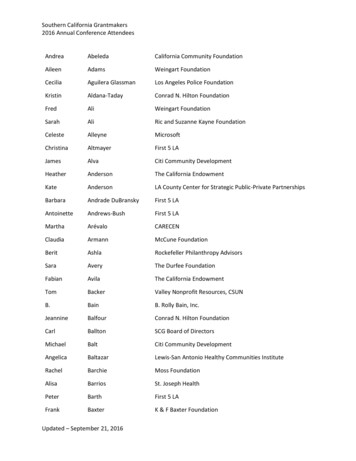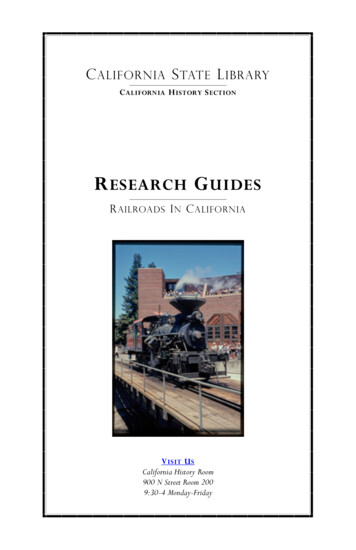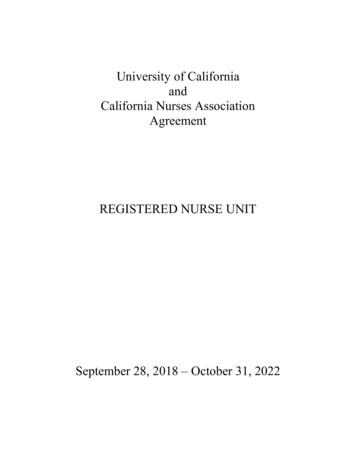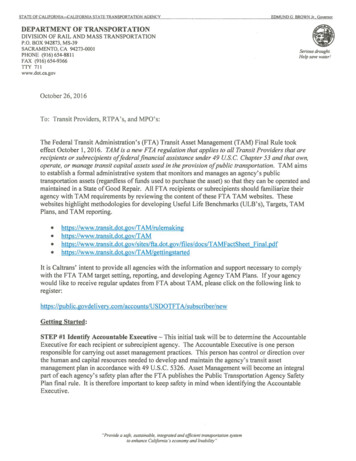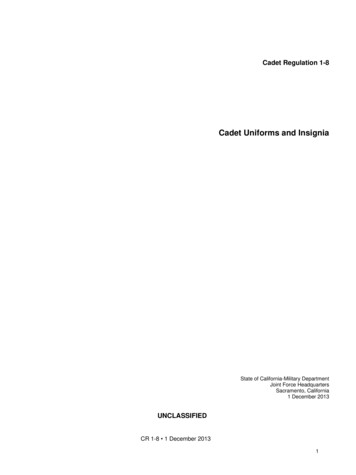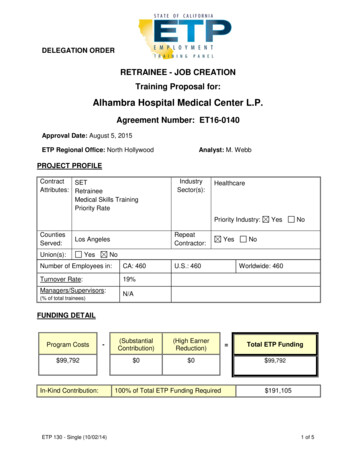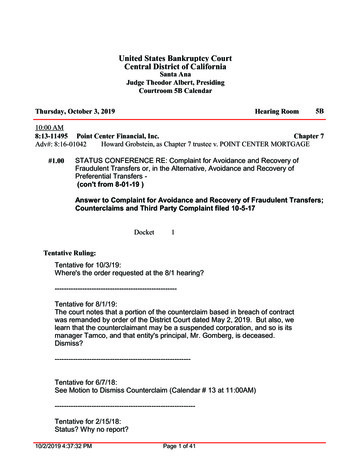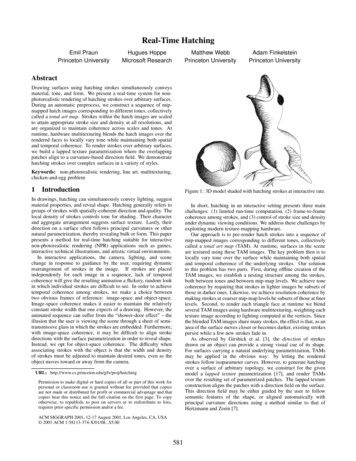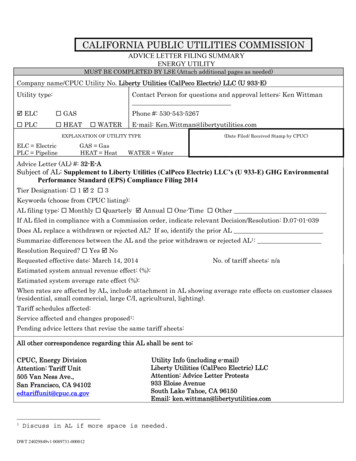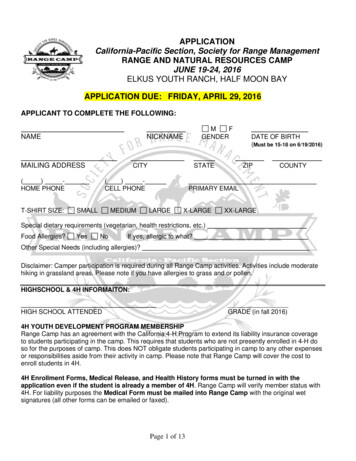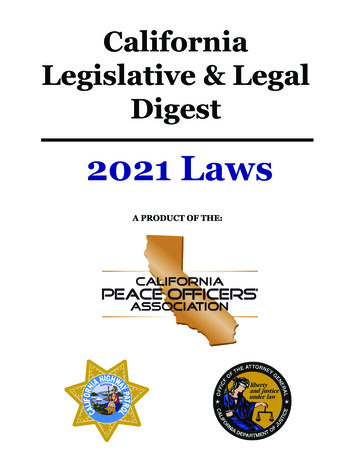
Transcription
CaliforniaLegislative & LegalDigest2021 LawsA PRODUCT OF THE:
ACKNOWLEDGMENTSThis 2021 Legislative Update Digest was prepared and published by the California PeaceOfficers’ Association (CPOA) in cooperation with the Office of the California AttorneyGeneral and the California Highway Patrol.CPOA, in conjunction with the California Attorney General’s Office and the CaliforniaHighway Patrol, are responsible for the overall research and compilation of the billscontained in this digest.CPOA wishes to thank and commend Hon. Xavier Becerra, California Attorney General andCommissioner Warren Stanley of the California Highway Patrol for volunteering theservices of highly qualified personnel to make presentations on the legislation coveredwithin this digest.Shaun Rundle is CPOA’s Deputy Director, and he handles legislative affairs. Any inquiriesregarding the content of this digest, or requests for an electronic version should be directedto him at 916-520-2248, or via email at: SRundle@cpoa.org.
California Legislative Digest-2021 LawsTable of ContentsGENERAL LAW/STATUTE- CPOA & CHPCIVIL PROCEDURE/COURT ORDERSAB 904- Search warrants: tracking devices7AB 1869- Criminal fees8AB 1927- Witness testimony in sexual assault cases: inadmissibility in a separate prosecution9AB 2147- Convictions: expungement: incarcerated individual hand crews10AB 2338- Courts: contempt orders11AB 3234- Public safety: misdemeanor diversion12SB 1141- Domestic violence: coercive control13COMMUNICATIONS/9-1-1AB 1775- False reports and harassment16CONTROLLED SUBSTANCES/NARCOTICSAB 1458- Cannabis testing laboratories18AB 2077- Hypodermic needles and syringes19SB 1244- Cannabis testing laboratories20CORRECTIONS/PAROLEAB 1304- California MAT Re-entry incentive program22AB 3043- Corrections: confidential calls24SB 132- Corrections25CRIMES/CRIMINAL PROCEDUREAB 1969- Secondhand goods: personal property: reporting requirements27AB 2512- Death penalty: person with an intellectual disability28AB 2542- Criminal procedure: discrimination30AB 2655- Invasion of privacy: first responders33SB 903- Grand theft: agricultural equipment34EMPLOYMENT OF PEACE OFFICERSAB 846- Public employment: public officers or peace officers361
California Legislative Digest-2021 LawsFIREARMSAB 2061- Firearms: inspections38AB 2362- Firearms dealers: conduct of business39AB 2617- Firearms: gun violence restraining orders40AB 2699- Firearms: unsafe handguns41AB 2847- Firearms: unsafe handguns42SB 723- Firearms: prohibited persons43HOMELESSNESS & MENTAL HEALTHAB 465- Mental health workers: supervision45AB 2275- State armories: homeless shelters: security46JAIL OPERATIONSAB 732- County jails: prisons: incarcerated pregnant persons48JUVENILESAB 2425- Juvenile police records51AB 2805- Juveniles: reunification53SB 203- Juveniles: custodial interrogation54SB 823- Juvenile just realignment: Office of Youth and Community Restoration55SB 1126- Juvenile court records57SB 1290- Juveniles: costs58LOCAL OPERATIONS & POLICIESAB 1185- County board of supervisors: sheriff oversight61AB 2968- County emergency plans: best practices62AB 3099- DOJ: law enforcement assistance with tribal issues: study63SB 1123- Elder and dependent adult abuse64SB 1159- Workers’ comp: COVID-19: critical workers65MISCELLANEOUSAB 1945- Emergency services: first responders68SB 118- Public safety omnibus69SB 480- Law enforcement uniforms712
California Legislative Digest-2021 LawsPROBATIONAB 1950- Probation: length of terms73AB 2606- Criminal justice: supervised release file74PROSTITUTION, SEX CRIMES & HUMAN TRAFFICKINGAB 1145- Child abuse: reportable conduct76SB 145- Sex offenders: registration77RULES OF THE ROAD/TRANSPORTATIONAB 2285- Transportation79AB 2717- Motor vehicles: unattended children: liability80SB 909- Emergency vehicles81USE OF FORCEAB 1196- Peace officers: use of force84AB 1506- Police use of force852021 CPOA Legislative -------------------CASE LAW-DOJFOURTH AMENDMENTPeople v. Tran (2019) 42 Cal.App.5th 1: Seizure of property90People v. Flores (2019) 48 Cal.App.5th 617: Detention of suspect on foot91People v. Tacardon (2020) 53 Cal.App.5th 89: Detention via vehicle stop92Kansas v. Glover (2020) 140 S.Ct.1183: Reasonable suspicion for vehicle stop93People v. Mendoza (2020) 44 Cal.App.5th 1044: Reasonable suspicion for vehicle stop94People v. Shumake (2019) 45 Cal.App.5th Supp.1: Vehicle search-marijuana, PC, and automobile exemption95People v. McGee (2020) 53 Cal.App.5th 796: Vehicle search-marijuana, PC, and automobile exemption96People v. Lee (2019) 40 Cal.App.5th 853: Vehicle search-marijuana, automobile exemption, and vehicleinventory97People v. Vargas (2019) 9 Cal.5th 793: Probation search condition98People v. Rosas (2020) 50 Cal.App.5th 17: Probation search condition99People v. Rubio (2019) 43 Ca.App.5th 342: Residential search-emergency and exigency1003
California Legislative Digest-2021 LawsFIFTH AMENDMENTPeople v. Flores (2020) 9 Cal.5th 371: Questions to clarify a Miranda waiver101People v. Hernandez (2020) 9 Cal.5th 1013: Invocation to right to counsel102People v. Frederickson (2020) 8 Cal.5th 963: Post-waiver invocation of right to counsel103In re. Anthony L. (2019) 43 Cal.App.5th 438: Validity of juvenile’s Miranda waiver and admissions104People v. Leon (2020) 8 Cal.5th 831: Effect of consular notice on Miranda waiver1054
California Legislative Digest-2021 LawsSTATUTE5
California Legislative Digest-2021 LawsCIVIL PROCEDURE/COURT ORDERS6
California Legislative Digest-2021 LawsAB 904 (Chau)- Search warrants: tracking devicesPenal Code Section 1534 (Amend)SUMMARY:Provides that if a law enforcement agency utilizes software to track a person's movements, whether inconjunction with a third party or by interacting directly with a person's electronic device, the provisionsfor obtaining a tracking device search warrant apply.HIGHLIGHTS: PC 1534 does not specifically authorize (but allows) the use of any device or software for thepurpose of tracking the movement of a person or object.WHAT THIS BILL MEANS TO LAW ENFORCEMENTIn addition to the PC 1534 requirements, agencies must continue to comply with the CaliforniaElectronic Communications Privacy Act (CalECPA), which mandates a warrant for non-exigency phoneor online searches.In the case of emergency warrants, it does not appear to interfere with Missouri v. McNeely (2013) caselaw, where it clearly defines exigent situations where a warrant is not necessary.There could be an interpretation of the bill by the telecom companies themselves, where they coulddeny exigency warrants due to lack of a search warrant, but we would still have case law on our side.NOTES:7
California Legislative Digest-2021 LawsAB 1869 (Budget Committee)- Criminal feesVarious CodesSUMMARY:Makes changes to 23 criminal administrative fees.HIGHLIGHTS:Government Code Section 27706 Repeals statutes associated with Public Defense Fees, Cost of Counsel, Public Defense RegistrationFee, and Public Defense Fees for Minors. Repeals statutes associated with various Criminal Justice Administration Fees. Specifically, repealsprovisions allowing for the recovery of costs associated with arrest. Repeals statutes associated with the 25 Administrative Processing Fee and 10 CitationProcessing Fee. Repeals the Interstate Compact Supervision Fee. Specially repeals statutes that provides that aprobationer cannot be released to another state until the probationer has paid the reasonablecosts of processing their request to move states. Repeals statutes associated with alternative custody.o Eliminates the ability to charge an administrative or application fees for work furloughor home detention and eliminates other fees relating to home detention.o Repeals provisions that allows fees for pretrial electronic monitoring, provides theability of probation to charge a person for electronic monitoring, and gives a countythe ability to seek reimbursement for the reasonable costs of county parolesupervision. Finally, it repeals the Probation Department Investigation/ProgressReport Fee.WHAT THIS BILL MEANS TO LAW ENFORCEMENTNo immediate impact.NOTES:8
California Legislative Digest-2021 LawsAB 1927 (Boerner Horvath)- Witness testimony in sexual assaultcases: inadmissibility in a separate prosecution.Penal Code Section 1324.2 (Add)SUMMARY:Makes testimony that a victim or witness in a felony sexual assault prosecution was using or inpossession of drugs or alcohol at the time of the sexual assault inadmissible in a separate prosecutionof that victim or witness.HIGHLIGHTS: Specifies that evidence that the testifying witness unlawfully possessed or used a controlledsubstance or alcohol is not excluded in the felony prosecution of a violation or attemptedviolation of specified sexual assault offenses. Specifies that evidence that a witness received use immunity for testimony related topossession of drugs or alcohol is not excluded in the felony prosecution of a violation orattempted violation of specified sexual assault offenses.WHAT THIS BILL MEANS TO LAW ENFORCEMENTNo immediate impact.NOTES:9
California Legislative Digest-2021 LawsAB 2147 (Reyes)- Convictions; expungement; incarceratedindividual hand crews.Penal Code Section 1203.4(b) (Add)SUMMARY:Allows a defendant who successfully participated in the California Conservation Camp Program (FireCamp) or a county incarcerated individual hand crew to petition for a dismissal of their conviction.HIGHLIGHTS: Successful participation in a conservation camp program and successful participation as amember of a county incarcerated individual hand crew, as determined by the appropriate countyauthority, means the incarcerated individual adequately performed their duties without anyconduct that warranted removal from the program. A defendant who successfully participated in a fire crew, as specified, must also be released fromcustody before a court would be authorized to order a dismissal of conviction as provided by thisbill. Defendants are automatically ineligible, if convicted of the following crimes: MurderKidnappingRape [PC 261(a)(2) or (6)] or spousal rape [PC 262(a)(1) or (4)]Lewd acts on a child under 14 years of ageAny felony punishable by death or LWOPPC 290 sex offensesEscape from secure perimeter within the previous 10 yearsArsonWHAT THIS BILL MEANS TO LAW ENFORCEMENTNo immediate impact to policing, but unknown, potentially significant workload cost pressures to thecourts in the low hundreds of thousands of dollars to hear and adjudicate petitions for relief pursuantto this measure.NOTES:10
California Legislative Digest-2021 LawsAB 2338 (Weber)- Courts: contempt ordersCivil Procedure Code Section 1218 (Amend)SUMMARY:In lieu of an order of imprisonment, community service, or both, for a person found in contempt forfailure to comply with a court order under the Family Code, the court may grant probation, as defined,or a conditional sentence, as defined, for a period not to exceed one year upon a first finding ofcontempt, a period not to exceed two years upon a second finding of contempt, and a period not toexceed three years upon a third or any subsequent finding of contempt.HIGHLIGHTS: “Probation” is defined to mean “the suspension of the imposition or execution of a sentenceand the order of conditional and revocable release in the community under the supervision ofa probation officer.” “Conditional sentence” is defined to mean “the suspension of the imposition or execution of asentence and the order of revocable release in the community subject to conditionsestablished by the court without the supervision of a probation officer.”WHAT THIS BILL MEANS TO LAW ENFORCEMENTNo immediate impact.NOTES:11
California Legislative Digest-2021 LawsAB 3234 (Ting)- Courts: contempt ordersPenal Code Chapter 2.96 (Commencing with Section 1001.95) of Title 2, Part 2 (Add)SUMMARY:Creates a court-initiated misdemeanor diversion program and lowers the minimum age limitation (from60 years old or older) for the Elderly Parole Program to inmates who are 50 years of age and who haveserved a minimum of 20 years.HIGHLIGHTS: A superior court judge would be authorized to divert a misdemeanor defendant over theobjection of the prosecution. Unlike existing general misdemeanor diversion, this bill has nostatutory requirements for the defendant to satisfy in order to be eligible nor would anymisdemeanors be statutorily excluded. Whether or not to divert a misdemeanor defendantwould be in the trial court's discretion. Provides that the following misdemeanors cannot be diverted: any offense for which thedefendant would be required to register as a sex offender; domestic violence; or stalking.WHAT THIS BILL MEANS TO LAW ENFORCEMENTNo immediate impact.NOTES:12
California Legislative Digest-2021 LawsSB 1141 (Rubio)- Domestic violence: coercive controlFamily Code Section 6320 (Amend)SUMMARY:Codifies and elaborates on case law defining when a restraining order under the Domestic ViolencePrevention Act ([DVPA] Fam. Code § 6200 et seq.[1]) may be issued because a person was “disturbingthe peace of the other party” (§ 6320), which includes coercive control.HIGHLIGHTS: Makes certain findings and declarations relating to the impact of COVD-19 on victims ofdomestic violence. Drawing on relevant case law, defines the term “disturbing the peace of the other party” underSection 6320 as conduct that, based on the totality of the circumstances, destroys the mentalor emotional calm of the other party. Specifies that such conduct may be committed directly or indirectly, including through the useof a third party, and by any method or through any means including, but not limited to,telephone, online accounts, text messages, internet-connected devices, or other electronictechnologies. Specifies that such conduct includes, but is not limited to, coercive control, defined as a patternof behavior that in purpose or effect unreasonably interferes with a person’s free will andpersonal liberty. States that examples of coercive control include, but are not limited to unreasonably engagingin any of the following:o Isolating the other party from friends, relatives, or other sources of support.o Depriving the other party of basic necessities.o Controlling, regulating, or monitoring the other party’s movements,communications, daily behavior, finances, economic resources, or access toservices.o Compelling the other party by force, threat of force, or intimidation, includingthreats based on actual or suspected immigration status, to engage in conduct fromwhich the other party has a right to abstain or to abstain from conduct in which theother party has a right to engage. States that it does not limit any remedies available under any provision of law.13
California Legislative Digest-2021 LawsWHAT THIS BILL MEANS TO LAW ENFORCEMENTIn writing a police report, if an officer needs to articulate that a person is “disturbing the peace” of aprotected person based on the new criteria of “coercive control”, the officer will need to articulate inthe report that the offender unreasonably interfered with a protected party’s free will and personalliberty to interact with family, friends or household members.The acts can include: Texts, messages and internet use to family and relatives to prevent or discourage visiting that isintended to isolate the protected party from their friends and family Controlling, regulating, or monitoring movements and communication such as distributing emailsor posting to social media to discourage family, friends and household members fromcommunicating or having relations with the protected party. Making threats against immigration status of a protected partyNOTES:14
California Legislative Digest-2021 LawsCOMMUNICATIONS/ 9-1-115
California Legislative Digest-2021 LawsAB 1775 (Jones-Sawyer)- False reports and harassment.Civil Code Sections 47 and 51.7 (Amend) and Penal Code Section 653ySUMMARY:Makes it a "wobblette" to knowingly use the 911 emergency system for the purpose of harassinganother, and increases the penalty for this crime by up to one year in county jail, or a fine of no morethan 2,000 if the harassment is also an act defined to be a hate crime or is an offense committedagainst a person based on their perceived race, ethnicity, religion, nationality, country of origin,ancestry, disability, gender, gender identity, gender expression, or sexual orientation.HIGHLIGHTS: Establish a misdemeanor or infraction (‘wobblette’) if a person knowingly uses the 911emergency system for the purpose of harassing another is a crime, punishable as follows:o For a first violation, as an infraction punishable by a 250 fine or as a misdemeanorpunishable by up to six months in a county jail, a fine of up to 1,000, or both thatimprisonment and fine.o For a second or subsequent violation, as a misdemeanor punishable by up to six monthsin a county jail, a fine of up to 1,000, or both that imprisonment and fine.o If a person knowingly allows the uses 911 to harassing another person and that act isdescribed in Section 422.55 or 422.85, the person is guilty of a misdemeanor punishableby up to one year in a county jail, a fine of not less than 50 nor more than 2,000, orboth that imprisonment and fine. Provides that a "privileged communication" does not include calls using the 911 emergencysystem for purposes of making a false report. Amends the Ralph Civil Rights Act to hold that "intimidation by threat of violence" includesmaking a threatening claim or report to a peace officer or law enforcement agency that falselyalleges that another person is engaged in unlawful activity, knowing that the claim is false orwith a reckless disregard for the falsity. State that this bill does not apply to uses of the 911 emergency system by a person with anintellectual disability or other mental disability that makes it difficult or impossible for the personto understand the potential consequences of their actionsWHAT THIS BILL MEANS TO LAW ENFORCEMENTNo immediate impact.NOTES:16
California Legislative Digest-2021 LawsCONTROLLED SUBSTANCES/NARCOTICS17
California Legislative Digest-2021 LawsAB 1458 (Quirk)- Cannabis testing laboratoriesBusiness and Professions Code Section 26100 (Amend)SUMMARY:Requires, for edible cannabis products, the certificate of analysis to report that the milligrams(mg) of Tetrahydrocannabinol (THC) per serving does not exceed 10 mg per serving, plus orminus 12% until January 1, 2022, and plus or minus 10% after January 1, 2022.WHAT THIS BILL MEANS TO LAW ENFORCEMENTMay impact DRE responses to edible products.NOTES:18
California Legislative Digest-2021 LawsAB 2077 (Ting)- Hypodermic needed and syringesBusiness and Professions Code Sections 4145.5 (Amend), 4142 and 4326 (Repeal) and Health andSafety Code Sections 11364 (Amend) and 121285 (Repeal)SUMMARY: Extends the sunset, from January 1, 2021 to January 1, 2026, of an existing law that doesthe following:o Permits pharmacists or physicians to furnish hypodermic needles and syringes forpersonal use by a person 18 years or older without a prescription or permit.o Permits a person who is 18 years of age or older to obtain hypodermic needles andsyringes solely for personal use, without a prescription or license, from a physicianor pharmacisto Requires a pharmacy or hypodermic needle and syringe exchange program tocounsel consumers on one or more safe disposal options identified in the languageof the bill. This bill also decriminalizes specified conduct related to obtaining hypodermic needles orsyringes and repeals the Disease Prevention Demonstration Project.WHAT THIS BILL MEANS TO LAW ENFORCEMENTDoes nothing to encourage treatment and instead facilitates, thereby encouraging drug use.NOTES:19
California Legislative D
Legislative & Legal Digest 2021 Laws A PRODUCT OF THE: . AB 2077- Hypodermic needles and syringes 19 . . (but allows) the use of any device or software for the purpose of tracking the movement of a pe
